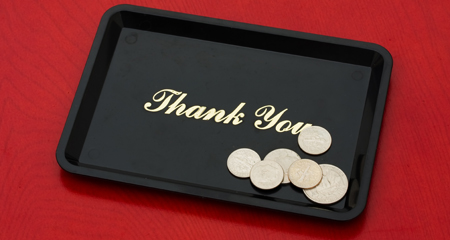When I was sixteen, I worked as a cashier at a local bakery on Saturday and Sunday mornings, the two busiest days of the week. I would often leave work with $40 USD or more—just about half a shift’s wage—shoved in my pocket, mostly wrinkled dollar bills that were stuffed into the tip jar. I liked my daily bonus, but hardly a day went by without some tip jar incident that made my skin crawl, from simple awkwardness to borderline harassment.
Tipping is an antiquated system that perpetuates inequality and inconsistency across the service industry. The current tipping system in North America is a band-aid for much more complex issues of job security, wage inequality, and discrimination. Instead of relying on tipping, restaurants should impose a flat service fee, or incorporate the hospitality charge into food prices for the benefit of both their workers and their customers.
One of the primary arguments against tipping is that it leads to wage inequality between the kitchen and the serving staff. In October 2015, New York restaurateur Danny Meyer announced that he would eliminate tipping in his businesses, largely to address this wage gap: By banning tipping, Meyer expected to see the hourly wage for kitchen staff rise from $11.75 to $15.25 by distributing a fixed hospitality charge evenly between wait and kitchen staff.
Sharing the tipping wealth not only stabilizes wages, but, in the long-run, attracts more talented and professional chefs. Chefs don’t necessarily get into the business for the money, despite the indispensable service they provide. Low and sometimes inconsistent wages often creates a lack of job security or commitment. Instituting shared hospitality charges makes it easier to make a career and a livelihood out of being a chef.
Tipping destabilizes waiters’ incomes. Employers, not customers, should pay their employees’ full wages directly. Laws vary between provinces and states, but in the U.S. and Canada it’s common that restaurants pay servers below minimum wage under the assumption that their tips make the difference. However, slow nights or uncharitable customers means that this isn’t always the case, and it’s hard to hold employers accountable for such variations on a shift-by-shift basis. Phasing out tipping would eliminate wage uncertainty as well as curb illegal labour practices.
In theory, tipping encourages high quality service, and promotes a reciprocal relationship between service staff and customer. But, the service that tipping supposedly pays for—qualities such as friendliness and attentiveness—should be considered as integral to servers’ living wages, not conditional on the almost extra-legal monetary interaction directly between customer and server.
Tipping is supposed to maintain a symbiotic relationship between waiter and customer, but this relationship can easily turn parasitic. Banning tipping would eliminate the discriminatory and sometimes uncomfortable expectations that come with customer interactions. In the meritocratic tip system, servers are subjected to the preferential whims of their customers, be it based on race, gender, or age. A 2008 Cornell University study found that consumers discriminated against black servers by tipping them less than their white counterparts. Another study by Cambridge University in 2015 found that the tip interaction between female waiters and customers can be sexualized, and that tipping promotes a relationship of unequal power that leaves female servers vulnerable to gendered discrimination and harassment. By banning tipping, restaurants would mediate the unequal relationship between server and customer, which can result in discrimination based on identity.
Tipping, like relying on phone booths or leaving voicemails, is an outmoded practice. In doing away with tipping, restaurants and other service businesses would be demonstrating good faith and respect towards their workers as well as their customers.









